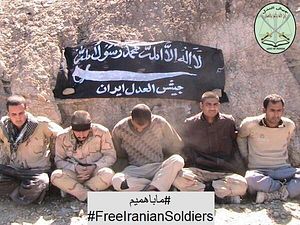Relations between Iran and Pakistan are growing strained over the kidnapping of five Iranian border guards in Iran’s Sistan Baluchistan region by the Iran-based Sunni militant group Jaish al-Adl (Army of Justice). The five guards are now suspected to be in Pakistani Balochistan.
In response to the kidnapping, Iranian Interior Minister Abdolreza Rahmani-Fazli told Iran’s Mehr news agency that “If Pakistan doesn’t take the needed steps to fight against the terrorist groups, we will send our forces into Pakistani soil. We will not wait for this country.”
The minister noted that should Pakistan refuse to treat the case “strongly and seriously,” it must allow Iran to secure the region against what it perceives to be a significant domestic terrorist threat. “Otherwise we do consider it our own right to intervene and create a new security sphere for our safety,” he said.
According to other Iranian sources, an Iranian delegation visited Pakistan on Monday in order to secure the guards’ release. Iran Students News Agency reports that Iran has summoned Pakistan’s ambassador to the country twice already over the issue.
In response to the Interior Minister’s comments, Pakistan warned Iran not to send its troops across their shared border in Balochistan. A Pakistani government statement warned that “Iranian forces have no authority to cross our borders in violation of the international law. We must respect each other’s borders.” The incident threatens to flare up sectarian tensions in bilateral relations between Iran’s largely Shia rulers and Sunni Pakistan.
The statement added that “The government of Pakistan regrets the suggestions of negligence on its part over the incident, especially when Pakistan’s active support against terrorists groups in the past is well-known and acknowledged by Iran.”
Jaish al-Adl has posted photographs of the five guards in an unknown location, showing them to be restrained but unharmed otherwise. According to the BBC, one of the guards, Sgt Jamshyd Danaifard, said they were “safe and sound” via a video broadcast on al-Arabiya TV. The kidnapping took place eleven days ago.
Iran has accused Pakistan of ignoring the threat posed to it by Jaish al-Adl in the past. In a letter to the president of the UN Security Council in October 2013, Iran’s Permanent Representative to the UN Mohammad Khazaei noted that Jaish al-Adl carried out terrorist attacks from eastern Pakistan.
Iran and Pakistan signed a security agreement in February 2013 which included counterterrorism measures. In October 2013, Iranian officials urged Pakistan to follow up on the commitments made in that agreement. “We urge the Pakistani government to take more measures than before to seriously tighten control over its borders,” said Iranian Deputy Interior Minister Ali Abdollahi at the time.
The Iranian interior minister’s comments over the latest incident are the product of over a year of frustration in Tehran that Pakistan is unable or unwilling to regulate its Balochistan border with Iran.

































